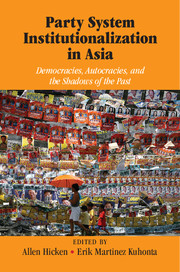Book contents
- Frontmatter
- Dedication
- Contents
- List of Figures
- List of Tables
- List of Contributors
- Acknowledgments
- 1 Introduction: Rethinking Party System Institutionalization in Asia
- 2 The Antidemocratic Potential of Party System Institutionalization: Malaysia as Morality Tale?
- 3 Institutionalized Succession and Hegemonic Party Cohesion in Singapore
- 4 Party System Institutionalization in Japan
- 5 Long in the Making: Taiwan’s Institutionalized Party System
- 6 The Making and Unmaking of the Communist Party and Single-Party System of Vietnam
- 7 The Institutionalization of the Communist Party and the Party System in China
- 8 Party System Institutionalization in India
- 9 Party and Party System Institutionalization in Cambodia
- 10 Explaining Party System Institutionalization in Indonesia
- 11 South Korea’s Weakly Institutionalized Party System
- 12 Thailand’s Feckless Parties and Party System: A Path-Dependent Analysis
- 13 Party and Party System Institutionalization in the Philippines
- 14 Party System Institutionalization: Reflections Based on the Asian Cases
- Index
- References
1 - Introduction: Rethinking Party System Institutionalization in Asia
Published online by Cambridge University Press: 18 December 2014
- Frontmatter
- Dedication
- Contents
- List of Figures
- List of Tables
- List of Contributors
- Acknowledgments
- 1 Introduction: Rethinking Party System Institutionalization in Asia
- 2 The Antidemocratic Potential of Party System Institutionalization: Malaysia as Morality Tale?
- 3 Institutionalized Succession and Hegemonic Party Cohesion in Singapore
- 4 Party System Institutionalization in Japan
- 5 Long in the Making: Taiwan’s Institutionalized Party System
- 6 The Making and Unmaking of the Communist Party and Single-Party System of Vietnam
- 7 The Institutionalization of the Communist Party and the Party System in China
- 8 Party System Institutionalization in India
- 9 Party and Party System Institutionalization in Cambodia
- 10 Explaining Party System Institutionalization in Indonesia
- 11 South Korea’s Weakly Institutionalized Party System
- 12 Thailand’s Feckless Parties and Party System: A Path-Dependent Analysis
- 13 Party and Party System Institutionalization in the Philippines
- 14 Party System Institutionalization: Reflections Based on the Asian Cases
- Index
- References
Summary
Political parties are often the weakest link in democracies, both young and old. This is the conclusion of a large number of scholars, policy consultants, and political practitioners. From Peru to the Philippines, these lynchpins of modern democracy are struggling to carry out the fundamental tasks of representing citizen interests and enabling voters to hold government officials accountable. In some parts of the world, the traditional connections between parties and their constituents are eroding (see the extensive literature on dealignment); in other parts of the world, meaningful links between parties and voters have yet to develop. Some systems present voters with a dizzying number of political parties, distinguishable more by the personalities at their helm than the policies in their platforms. In others, a single party so dominates elections that one can justifiably call into question the credibility of competition.
For scholars trying to make sense of the role parties play in supporting (or undermining) effective and robust democracies, party system institutionalization has emerged as an important concept. The literature on party system institutionalization suggests that a democracy with a more institutionalized party system is more likely to survive than one without. Institutionalized parties, defined as coherent, adaptable, and complex institutions, provide a stable means for channeling the interests of social groups and a mechanism for citizens to hold government accountable. Without parties acting as a bridge between state and society, demands from society will overwhelm government institutions and may lead to the weakening of democracy. Institutionalized parties thus serve as a crucial bulwark for sustaining democracy and maintaining its representative quality.
- Type
- Chapter
- Information
- Party System Institutionalization in AsiaDemocracies, Autocracies, and the Shadows of the Past, pp. 1 - 24Publisher: Cambridge University PressPrint publication year: 2014
References
- 9
- Cited by

